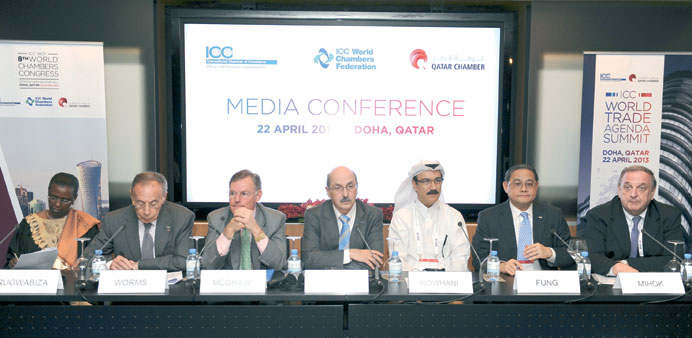The World Trade Organisation (WTO) hopes that 60% of the short-term suggestions from the International Chamber of Commerce (ICC) and Qatar Chamber to stimulate global trade, especially a pact on trade facilitation that could boost global GDP by $960bn and ensure additional 21mn jobs, are “doable” at the ministerial meeting this December.
“Three of the five recommendations made by the ICC Business World Trade Agenda (WTA) are deliverable (at the 9th WTO ministerial summit in Bali, Indonesia),” WTO deputy director general Valentine Sendanyoye Rugwabiza yesterday told reporters on the sidelines of the WTA. The event was organised in conjunction with the ICC World Chambers Congress that begins in Doha today.
The ICC and Qatar Chamber had viewed WTO agreements on trade facilitation and phasing out of farm subsidies as well as removal of food export restriction and trade barriers to IT as “tangible outcomes” this year in order to revive the stalled Doha Round trade talks.
“A very creative and innovative WTO trade facilitation agreement is imminently doable because the measures are already crafted,” she said. Technical assistance will be provided to those developing countries which are lacking in the capacity to implement those measures.
On the trade facilitation recommendation, she said an agreement will certainly inject a lot of certainty.
For developed countries, the estimated $950bn increase in two-way trade delivers GDP increase of about $440bn; while for the developing countries, the estimated $1tn gain in two-way trade delivers GDP increase of $520bn.
Overall, the potential trade expansion from a far-reaching trade facilitation agreement could translate into world GDP increase of $960bn annually, according to WTA.
The Peterson Institute in Washington, DC, recently studied lCC’s Business WTA, to quantify the potential benefits from the recommendations.
Another possible “doable” area, according to Rugwabiza, was on providing preferential market access through duty-free quota-free (DFQF), an area where members have reached an agreement.
The ICC recommended that developed WTO members, who have not already put in place DFQF regime, should implement it unilaterally, while simultaneously removing as many exclusions as possible to ensure that there is the broadest possible product coverage and that other “behind-the-border” barriers do not erode the benefits of this measure.
“Almost all world economies will do that. Indonesia announced very recently that they will provide DFQF market access for least developed countries,” she said.
Following the 8th WTO ministerial, progress was made favouring least developed countries when members agreed to adopt a waiver that permits preferential treatment to services exports of the 31 LDCs that are currently members of the WTO.
On the job enhancement, the WTA said by simplifying customs procedures - through trade facilitation measures alone - member countries would deliver global job gains of 21mn, with developing countries gaining more than 18mn jobs and developed countries increasing their workforce by 3mn.
It is estimated that the payoff from liberalising trade in services could generate world trade gains of $1.1tn, which could translate into global employment gains of 9mn jobs. At the same time, a meaningful WTO agreement on liberalising trade in environmental goods, even on a plurilateral basis, could deliver $10.3bn of additional exports.
The WTO official said Bali could witness agreements on some elements regarding to the agriculture sector although ICC-WTA recommended that WTO members should agree to phase out farm export subsidies. The WTA noted that in recent years, high commodity prices and national budgetary constraints have further reduced the need for these subsidy payments.
WTO members agreed on a timeline in 2008 to phase out export subsidies: 2013 for developed countries and 2016 for developing countries.
Business recommendations from WTA event will be delivered to 620 leaders and WTO ministers ahead of the next G20 summit in Saint Petersburg and the WTO ministerial conference in Bali later this year.

